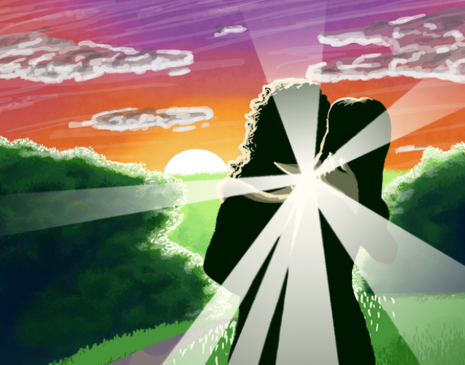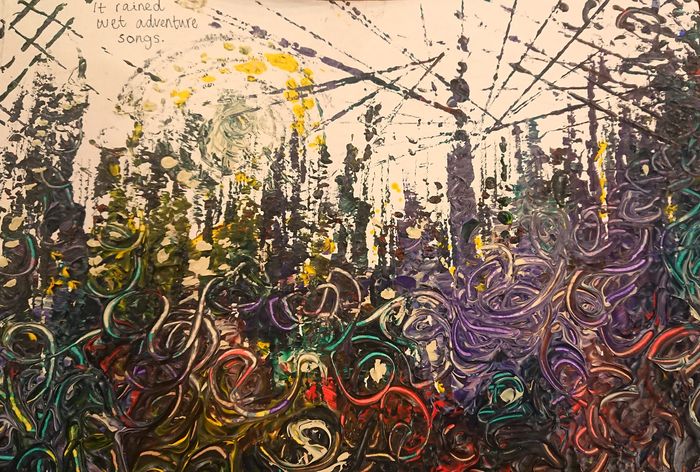The love that dare not speak its name
An anonymous student reflects on their struggles with coming out as bisexual in their traditional home town

“I just can’t imagine it, you know? I can’t imagine anyone nowadays who wouldn’t accept their kids as gay. My parents would love it. No, seriously, I think they’re hoping I’ll come out any day now.”
I smile like I agree, as though it seems to me too, to be a remote possibility. And, here, in Cambridge, it is. But Cambridge is not the only reality.
I like to joke that I was brought up in the 1950s. I say joke; it’s not an inaccurate description. My home-town village is idyllic. Around three hours cross-country from Cambridge is another flat, slightly rainy, green place. It’s a place where people go on holiday. It is peppered with small family-owned pubs; fireplaces and cheesy chips; welly-booted, darned-jumpered, flat-capped farmers; labradors; chocolate-box houses; fields. Miles and miles of fields. You can walk for hours and not run into a single person. My village has a church, a playground and a garage. I work in the pub in pheasant-hunting season. I know the regulars by name.
“He told me that it was unnatural; that ‘bisexual’ was another way of saying gay”
That pub is the same one where, at 14, I told my mum I was bisexual. It is the same pub where she told me to break up with my then-girlfriend, my first love; where she told me that it was unnatural; that ‘bisexual’ was another way of saying gay; that this was not the future that she had imagined for me. That she felt she had lost her daughter.
A month ago – roughly eight years on – I went home. On the way back from the station, I told my dad that I’d met this wonderful girl. That she was gorgeous, that she was kind, that she was funny. That she liked me too. I told him that I was excited, and anxious, and felt like I was falling head over heels. In the dark of the car, watching the road ahead, he told me that he didn’t think my eyes sparkled in the same way as when I talked about men. At that moment I was 14 again, sitting on the floor of the kitchen, biting back tears as I told my girlfriend on the phone that she couldn’t meet my family; I was 19 and my family was telling me they didn’t like the girl I was living with, but couldn’t give me a reason why. I am 22 and sitting in the car, eight years after coming out, feeling like I am back at the starting line.
“My mum has read up on bisexuality – apparently there’s a website, somewhere”
My parents are wonderful people. They are two of the kindest people I know. Homophobia – if that’s what it is – is a complicated, sometimes subtle, thing. My parents would never consciously try and hurt me or any other queer person. My dad, a few years ago, bought me a badge emblazoned with ‘still bisexual’; when I phoned he asked me about the girl I was seeing. My mum has read up on bisexuality – apparently there’s a website, somewhere – and realised I may, in fact, still end up with a bloke. I think that helped. So, they try. Things are better than they once were. Much better.
Even so, my dad is convinced that I am straight. My mum does not want to hear the poems I write about women. I cannot bring a girl home. I cannot bring a girl home because I know they would never like her as much as someone they could call my boyfriend.
But here, in Cambridge, I can hold a girl’s hand in the street, kiss her when I meet her, and introduce her to my friends. I can shave a slit into my eyebrow, and put rainbow laces in my shoes, and wear earrings that say ‘queer’. I can use pronouns that feel right. I can wear a suit or a ballgown and no one would bat an eyelid. No one questions my identity. I am who I say I am. And that is a wonderful thing. A wonderful, wonderful thing.
But if we take queer spaces for granted, if we assume that this acceptance exists everywhere, we risk complacency. We risk forgetting those of us that have to travel back to the 1950s every few months. And in the long term, if we are complacent, we risk those spaces disappearing, one by one.
I am sat across from a boy with an earring, a girl with dyed hair. We do not stand out. No one looks at us twice. Later I will go and see a girl for a drink. And I will bring her flowers, hold her hand, kiss her goodnight. And I will never stop being grateful that I can.
 News / Hundreds of Cambridge academics demand vote on fate of vet course20 February 2026
News / Hundreds of Cambridge academics demand vote on fate of vet course20 February 2026 News / Judge Business School advisor resigns over Epstein and Andrew links18 February 2026
News / Judge Business School advisor resigns over Epstein and Andrew links18 February 2026 News / Petition demands University reverse decision on vegan menu20 February 2026
News / Petition demands University reverse decision on vegan menu20 February 2026 News / University Council rescinds University Centre membership20 February 2026
News / University Council rescinds University Centre membership20 February 2026 News / CUCA members attend Reform rally in London20 February 2026
News / CUCA members attend Reform rally in London20 February 2026










